How the Executive Education Program helped a German newsroom leader develop strategy out of a pandemic crisis
COVID-19 hit Der Spiegel hard, pushing managing editor Susanne Amann to focus on the future of digital transformation at the legacy publication
Before 2020, Germany’s Der Spiegel was in an enviable position. One of the most respected media brands in Europe, the weekly news magazine was “very, very rich,” said managing editor Susanne Amann.
“We all have really good salaries, money didn’t matter at all in the last few years,” Amann said recently. So when COVID-19 struck in the spring of 2020 and forced Der Spiegel to cut costs, it was especially hard for the newsroom.
At the time, Amann was a member of the Executive Program in News Innovation and Leadership at the Newmark Graduate School of Journalism, a year-long program focused on helping newsroom leaders transform their organizations in the face of a changing industry.
She says her time in the program helped her to focus on building and implementing strategy, rather than making decisions on the fly. With her newsroom facing major budget cuts, she told management that they couldn’t just talk about cost cutting, which was demoralizing for the staff. Instead, they had to build a strategy for the future.
She developed “Double the Digital,” a goal to double the number of digital subscribers, from 100,000 to 200,000, by the end of 2025.
“The fact that we have put this in one sentence was due to the program because I knew I have to define really clearly what you want to achieve,” Amann said. The strategy went into effect last fall.
It wasn’t the first time that Amann was dealing with a big transformation at Der Spiegel. She became managing editor in 2019, at a time when the company was still divided into two completely separate newsrooms for its digital and print products.
“Before we merged, for example, we had a foreign desk for the digital part and a foreign desk for the print part,” Amann said. Part of her job was helping to balance the pace of a 24-hour digital news desk with the needs of a weekly newsmagazine.
Alongside the logistical elements of the merger, there were culture clashes between the print and digital teams. She says that the younger colleagues on the digital side were less focused on hierarchies and more conflict-averse, while the older print journalists were more confrontational and direct. She estimates that it will take another three to five years for “a new culture to develop itself” in the merged Der Spiegel newsroom.
Some of those print journalists also had egos from the glory days of Der Spiegel, which has long been one of the continent’s celebrated news brands.
“To realize that we don’t earn as much money as we earned before and that we have a lot of readers who are not willing to buy a print product anymore, that’s hard for some print colleagues,” Amann said. “And we still have some print colleagues who say, we only have to do a really good magazine and a really good print product, then everything is good.”
With support from a new editor-in-chief, Steffen Klusmann, who was more open-minded about the digital transformation, she also began pushing for the company to modernize its business model and leadership skills.
“I realized that only to work as a journalist is a great job, but the real challenges at the moment, I would say, are different,” Amann said.
This year, Der Spiegel has begun experimenting with audience engagement for the first time. The outlet has moved into special events on platforms like Instagram, and launched a new project, Republik 21, which focuses on unique content, live events and audience feedback in the run-up to the country’s general election in September.
“We didn’t do that before, because we are Der Spiegel and so we don’t care what our audience thinks or wants,” she explained. “So that’s a new part for us.”
Reflecting on her time in the program, she said the most important element was meeting others in the same boat. German newsrooms can be traditional and tech-averse, she says, often led by older men.
“If you come in and say, ‘Okay, let’s change because our business model is shrinking... we have to change our business model, we have to change the way we are working, we have to change the way we are doing leadership’,” Amann said. “They look at you like, ‘Okay, you are a little crazy young girl. So just go away.’”
“And then you come into this program, in this cohort, and you have all these really clever, interesting, funny people. And they are saying, ‘You are doing a great job, and you are doing exactly the right thing. And I have some tips, and I can help you.’ And that was great.”
Elise Czajkowski is a writer/editor who regularly writes about the Newmark Graduate School of Journalism’s executive and professional education programs. Based in New York, she was previously a Tow Knight Fellow in Entrepreneurial Journalism at the Newmark J-School. She launched a non-profit called Sidewalk News, which uses outdoor advertising to distribute local news.
